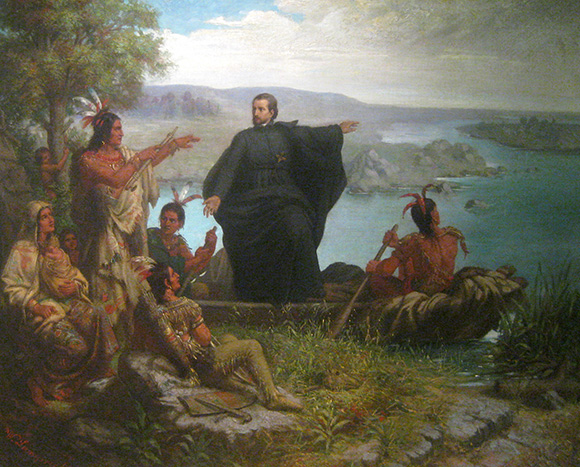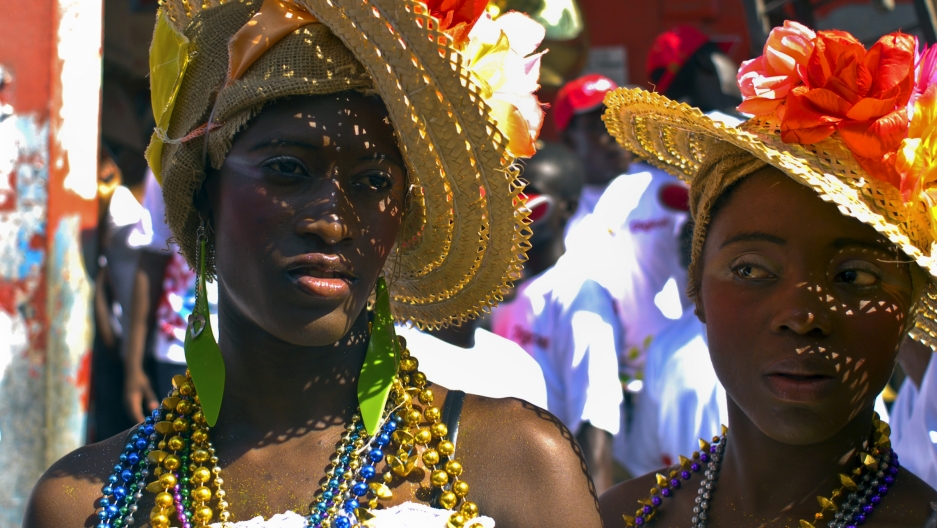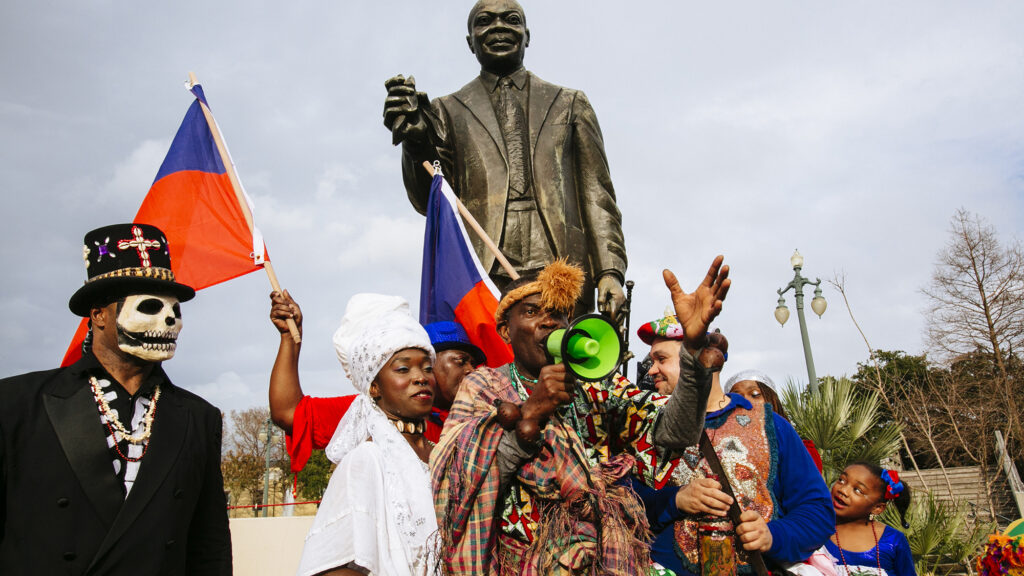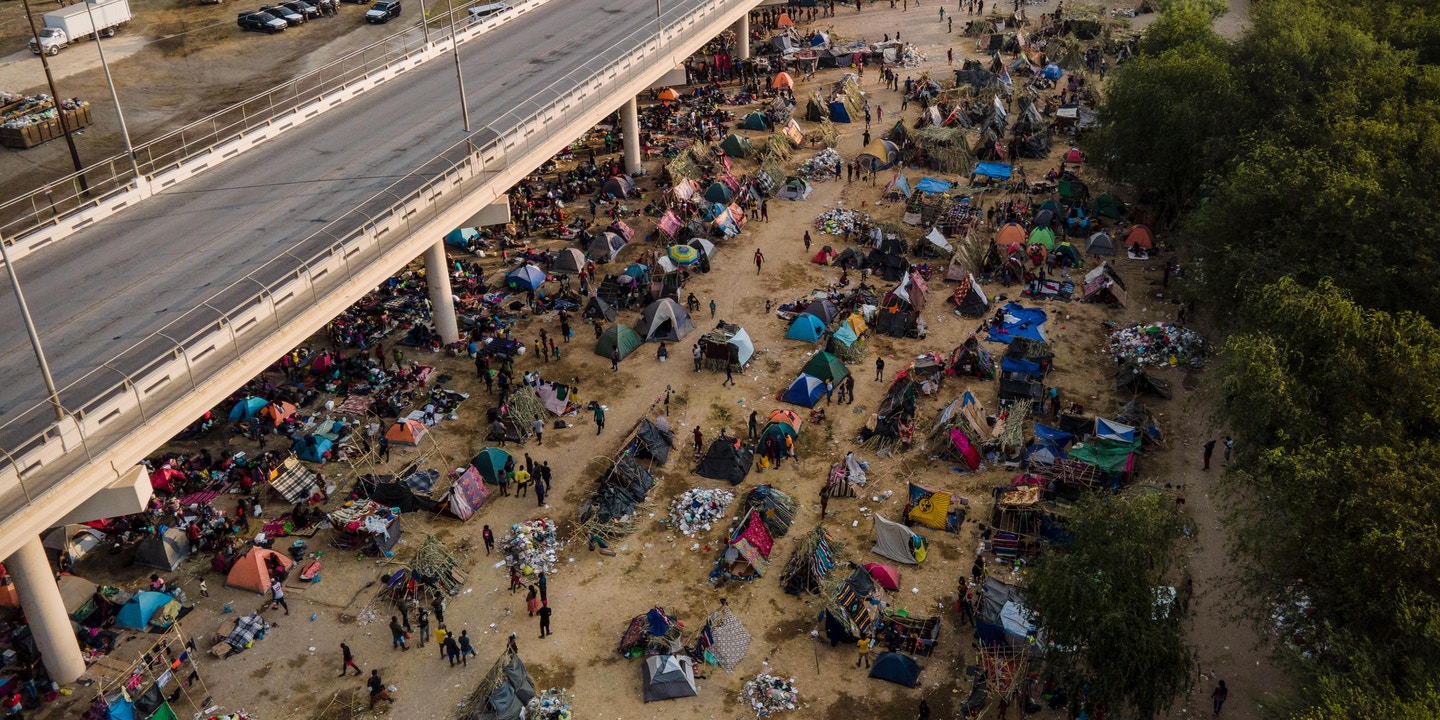Louisiana, like most of the area around the Mississippi River, used to be a part of the Kingdom of France.
Louisiana was a part of the Louisiana Territory of France, as an administrative district under New France, from 1682-1769 and from 1801-1803, although a few of these years are debated. Bourbon Spain ruled this territory in between France. The territory encompassed the full states of Arkansas, Kansas, Iowa, Missouri, and Oklahoma, parts of North Dakota, South Dakota, Montana, Wyoming, Colorado, New Mexico, Louisiana, Texas, and Minnesota, as well as parts of the Canadian provinces of Saskatchewan and Alberta. These parts were all bought by the USA in 1803, and in 1818, the parts of Saskatchewan and Alberta would be given to Canada, while Canada gave the USA parts of Minnesota, North Dakota, and South Dakota. Other parts of New France also saw some territorial changes, but earlier on. All of Quebec, most of the Maritime Provinces (Nova Scotia, New Brunswick, and Prince Edward Island) and parts of Ontario, Manitoba, and Newfoundland and Labrador that were part of New France, were ceded to Great Britain after the Seven Years’ War in 1763.

The Louisiana Territory of New France was immense. It was named after King Louis XIV, who is still currently the longest serving monarch ever as he ruled 72 years and 110 days from 1643-1715. The first capital was present-day Mobil, Alabama (1702-1720), followed by Biloxi, Mississippi (1720-1722), and then New Orleans, Louisiana after 1722, even under the Spanish. Once the USA took over the Louisiana Territory, the capital would go to St. Louis, Missouri, and continued to be the capital when most of the Louisiana Territory changed to the Missouri Territory until 1821. St. Louis is named for Roman Catholic Saint and King of France from 1226-1270, Saint Louis/King Louis IX. New Orleans, on the other hand, is named after Philippe II, Duke of Orléans, who served as Regent of France from 1715-1723 on behalf on King Louis XV.
Therefore, the modern-day state of Louisiana and its largest city, New Orleans, served as the home for overseas France in the USA for over 80 years. And as such, Louisiana and New Orleans have continued to have their own special Louisiana-French culture.
Let us just look at some examples of French heritage for both places. New Orleans is known for its French Quarter and Bourbon Street. Bourbon Street is named after the House of Bourbon that ruled over France for a very long time, and who now continues to rule over the Kingdom of Spain. The French Quarter is known for famous French, Spanish, and Creole Architecture. Famous places include Cathedral-Basilica of Saint Louis, King of France, a minor-basilica of the Roman Catholic Church. This basilica is the cathedral or mother church/seat/home of the Roman Catholic Archdiocese of New Orleans, the second oldest archdiocese in the USA, after the Roman Catholic Archdiocese of Baltimore. And there are plenty of other buildings too that resemble French architecture, whether they were built in French times or after. For example, the Pontalba Buildings were paid for and designed by New Orleans born Micaela Almonester, Baroness de Pontalba, daughter of a Spanish aristocrat father and a French aristocrat mother. She would spend a lot of her life in Paris and designed the famous Hôtel de Pontalba in Paris, in 1855. Since 1971, it has served as the official residence of the US Ambassador to France. New Orleans’s French Quarter is further known for its French cafe, Café du Monde, which was founded in 1862. Café du Monde and the greater cuisine of New Orleans is famous for its French pastries called beignets. Adrien de Pauger was a French cartographer and engineer who designed the French Quarter, as well as created the first maps of New Orleans, and would name most of the streets in the French Quarter after Roman Catholic Saints and French Royal Houses. Possibly what New Orleans is most famous for is Mardi Gras, which is celebrated two weeks before and up to Shrove Tuesday, the day before Ash Wednesday and start of Lent in the Roman Catholic Church’s calendar. New Orleans’s Mardi Gras was first celebrated by the French in 1699 and has continued to be a main stay in New Orleans since.
Then, when we look at Louisiana as a whole, we can see the French intertwined into the identity of Louisianians. For example, Louisiana has parishes instead of counties, which were used during French and Spanish colonial times. They have a separate legal system (Louisiana Civil Code) not based on English Common Law, rather based on French, German, and Spanish legal codes, via Roman law, with similarities to the Napoleonic Code, but not descended from it. And, the south of Louisiana is largely either French speaking, or descended from native French speakers. While Huguenot French people were among many of the largely Protestant-European ethnic groups to dominate the north of Louisiana, and thus make it mostly English speaking, the South of Louisiana had stayed mostly French speaking after the USA took over the present-day state. The Huguenots largely joined other Protestant sects and started to speak English in their early generations. The Protestants of Louisiana eventually primarily became part of the Southern Baptists. The Southern part of Louisiana, however, largely stayed Roman Catholic, and is where the most French speakers are presently, primarily in a region called Acadiana. Acadiana is mostly Roman Catholic, and formerly mostly French speaking. Currently, 4.5% of the people of Louisiana speak some version of French at home, while 7% (150,000-200,000 people) can speak it. However, Louisiana used to have more than 1,000,000 French speakers as late as 1968. The reason for the large French language decline in Louisiana is because in the 1800s and 1900s, the Anglophone Louisianians controlled the state and would create discriminatory rules against Francophone Louisianians, such as restricting the ability to write laws, teach at schools, and so on in French. Mobs would persecute French speakers. Businesses and the elite of Louisiana would privately discriminate against French speakers.
A lot of the French speakers opted to send their children to private Catholic schools who would teach in French, after the State of Louisiana banned the teaching of French in public schools. These Catholic schools would teach Standard French (proper/Parisian French). However, Louisiana eventually banned private schools from teaching French too, and would even subject students who spoke French on school grounds to corporal punishment. There were many campaigns against French speakers such as the slogan, “Don’t speak Cajun. Speak White!” Cajuns and other French speakers were often considered poor, stupid, and backwards by English speaking Louisianians, which further weakened French in Louisiana because there was a lack of pride amongst French speakers in the state, who often sought out to distance themselves from these negative stereotypes. So, by 1968, there were still plenty of the older generation who spoke French, but their younger descendants were largely non-French speakers, as their parents feared retribution for their children speaking French. Thus, once this older generation were no longer alive, their younger generation and its kids were largely not able to speak French.
But, since 1968, Louisiana has changed their constitution to once again incorporate their French identity into their state. They created a French language state agency to promote and rejuvenate French into Louisiana. This revival has done a good job encouraging newer generations to learn French once again, and to speak it. The agency is called the Council for the Development of French in Louisiana (CODOFIL)/le Conseil pour le développement du français en Louisiane. It is based in the City of Lafayette, named after Gilbert du Motier, Marquis de Lafayette, a famous French aristocrat and military officer who served the Kingdom of France and the United States of America in the Revolutionary War, and then helped write The Declaration of the Rights of Man and of the Citizen, which would help spur France into a liberal democratic society. He thus would become Commander-in-Chief of France and would try to steer the middle ground in the French Revolution (which radicals would then turn on him for). The City of Lafayette is the primary city of Acadiana (not all of Southern Louisiana is in Acadiana), hence why CODOFIL was put in Lafayette. CODOFIL seeks to “provide access to economic, educational, cultural and professional opportunities in French to all Louisianians.”
It has many language emersion programs, such as their famous Escadrille Louisiane program, which allows Louisiana French speakers to study French at the Université de Rennes in France on scholarship, in exchange for a promise of at least three years of teaching French in Louisiana. It seeks to make French a sizable second language in Louisiana, by encouraging and sponsoring French classes. They recruit many teachers from France, Belgium, and Canada especially. And, CODOFIL wants to use this to increase business and tourism with French speaking nations. In fact, the State of Louisiana is now an observer member of the Organisation internationale de la Francophonie, an international organization for Francophone countries/regions. Louisiana joined in 2018.
There are primarily three versions of French spoken in Louisiana. The first version is Standard French, which is being taught in schools, often times, and is the proper dialect of French. It is not the primary French dialect in Louisiana, however. The next one is Cajun French. Cajun French comes from the Acadians, who were French settlers in the Maritime Provinces of Canada (Nova Scotia, New Brunswick, and Prince Edward Island), but following the French and Indian Wars of the 1750s and 1760s, as well as some earlier conflicts, they were expelled from the Maritime Provinces, and then expelled from New England. Bourbon Spain welcomed them in, and thus their dialect came to be called Cajun French, as well as their ethnic group. They also speak a dialect of English called Cajun English.
However, the Cajun French used to simply be part of the ethnic group called Louisiana Creoles. The Louisiana Creoles are mainly descendants of Louisianians of the colonial era, and thus are mainly French, Spanish, African, and Native American descended. They speak French, Spanish, English, and a French dialect called Louisiana Creole. It mostly comes from a mixture of French and West African languages, and now is highly endangered. Together with Cajun French and French spoken in Louisiana, it forms Louisiana French. Ironically, while the Spanish attempted to make Louisiana Spanish-speaking, they never really could and they often recruited French speakers and brought over enslaved French speaking Africans. Even the Isleños, descendants of Canarians from the Canary Islands of Spain became largely French speakers in Louisiana. After all, it was the Spanish who brought in the Cajuns that provided an extra spark in the expansion of the French language in Louisiana. It is important to note too, that the ethnic group of Louisiana Creole is not a racial identifier, rather is one to just signify a French speaker born in the “New World” (the Americas), as opposed to one born in/from the “Old World” (Europe, Africa, Asia, and Oceania). And, speakers of Louisiana French come from all ethnic and racial groups, especially when admixture is taken into account, such that many African, European, and Native American descended peoples are French speaking in Louisiana, and most of these are Roman Catholic.
Now, with the recent increase of Haitian refugees into Texas, the President Biden Administration has done what it was brought in not to do by its own voters, and that is deport tons of people who have sought asylum, under a President Trump era policy, using COVID-19 as a cover. But, most people believe President Biden is cracking down on immigration because it is considered deeply unpopular among many groups in the USA. Many people are worried that Haitians and people from other countries “will take American jobs”, “not assimilate”, “will make America more dangerous”, and many other accusations like “will bring down wages” and “will change the identity of America”. Now, whether any of these accusations are true is one issue (hint, they usually are not/are largely exaggerated). But, let us just entertain the idea that these accusations are true. And, if true, yes, maybe Haitians do not exactly fit the classic Texan fold. Texans are largely Hispanic, White, and Black English and Spanish speakers. But, in Louisiana, it really is a melting pot of Jumbo when it comes to race and ethnicity. Addressing some of these points is key.
Haitians are actually a very important part to Louisiana history. After the Haitian Revolution of 1804, many Haitian refugees came to New Orleans and the surrounding areas of Louisiana, and this influx of Haitians helped keep French a main language among Louisianians and in New Orleans especially. They supposedly doubled the population of New Orleans at the time. With these Haitians and Haitians that have come after, they have grown the Roman Catholic faith too, which is integral to the identity of Louisiana. They also brought with them Haitian Voodoo, which along with Louisiana Voodoo, is the voodoo practiced in Louisiana. But, for the most part, they just brought Roman Catholicism in.
Haitians speak Haitian Creole (French based) and Standard French, and are still largely Roman Catholic. And, with the State of Louisiana seeking to increase the use of the French language, CODOFIL should really support more Haitian refugees coming into Louisiana to increase the amount of Francophones. Considering that only 7% of Louisianians speak French, and considering Louisiana wants an increase in French speaking tourism and education, I doubt that Haitians “will be taking American jobs”. Already, Louisiana brings in Belgian, Canadian, and French people to work in their French language fields. Hence, most of the jobs Haitians will probably take will be jobs for French speakers, which they would probably be most qualified for anyway. As shown in history, and the present-day culture of Louisiana, Haitians would easily assimilate into the Louisiana culture because they are already a main part of the Louisiana culture. It would be akin to being concerned if Asians could assimilate into Hawaiian culture at this point. Louisiana is already known for having a large Black population, and a large Haitian population. And, Louisiana is unique in that it has a very big Black Catholic tradition, with many Black communities being predominantly Catholic.

In fact, New Orleans is home to the only Catholic HBCU (Xavier University of New Orleans founded by St. Katherine Drexel, the only American Catholic university founded by an American-born Saint). As to making America more dangerous and bringing down wages, if Haitians are given legal asylum status, this will force companies to have to pay them regular state wages, which should decrease their incentive to commit crimes. Furthermore, the risk to deportation if one commits crime is high, and most Haitians will not want to go back to Haiti if they are trecking across the Gulf of Mexico, deserts, and rivers to get to the USA. Already, New Orleans is considered a sanctuary city, which means that even if these Haitians did not get proper asylum status, or other immigration status, they would still be largely safe from deportation as long as they did not commit any crime. As for “changing the identity of America”, that is sort of irrelevant when thinking of Louisiana. Louisiana is the USA’s Quebec, the USA’s Northern Ireland, is the USA’s well, the USA’s Louisiana.
Louisiana is already unique in the American identity, and it does not fit its own region even. It is unique in that it has a vibrant Catholic history and population in the largely Protestant Deep South, with a history of free Blacks who even fought for the Confederates (well tried to, but were not as successful at fitting in as their Native American and White counterparts), to being French speaking, to having a pro-life Democratic Governor. It is also home to French speaking Native Americans, who too fought with the Confederates, an odd history indeed for people who do not quite understand the unique situation of Louisianian culture. It is the LA people do not think of when bringing up the USA. Haitians already fit the Louisiana culture, and more Haitians in Louisiana would not change the USA that much, because Louisiana is already a different identity in itself.

As for the Governor, Governor John Bel Edwards is a very pro-immigrant/refugee governor. As a Catholic, he and the Louisiana Conference of Catholic Bishops were quick to say that Louisiana would continue to welcome refugees in 2019, against President Trump’s wishes, using many Catholic charities to do so. Louisiana has a good Catholic governance structure, as all diocese are under the Ecclesiastical Province/Archdiocese of New Orleans, which helps with organizational efforts. And, the worry of non-citizens voting in American elections that is often brought up when speaking of refugees is not as founded in Louisiana, as Governor John Bel Edwards supports Voter IDs, meaning that if anything, most likely, voter fraud would not happen in federal elections in comparison to most other states. The only concern for refugees voting would be within the cities, parishes, and the state itself, but considering that Louisiana is largely Republican, with strong Democratic pockets, where Haitians will move into, they really would not change much (given their projected party preference).
Given the federal nature of the USA, this appears to be a situation best left to the State of Louisiana to decide. Currently, Louisiana is classified as one of the poorer states, with a poor environmental record. There is lots of gangs and drug trading, due to a lack of opportunity. And, therefore, increasing programs like French learning and French scholarships, and increasing industries such as French tourism, while working more closely with private charity networks, could create a more economic boom for Louisiana. It would be such an advantage for young Louisianians to be able to communicate fluently in both English and French, because most of the wealthiest countries, and most of the highest paying jobs are largely in both languages. It would expand the job market for the people of Louisiana, while making their identity more unique, more prideful, and making the people smarter and more well-rounded. Imagine how many more opportunities the cooking industry could provide Louisianians if they spoke the main language for cooking, French, and of course the world-wide lingua franca, English. They would have so many opportunities to work in France and across the European Union. And, as far as other jobs go, the ability to work with most of Africa, which is expected to be 4 Billion people by 2100, will be massive as almost all countries in Africa either speak English or French as an official language.

Plus, Louisiana entertainers would be able to enter into the Francophone entertainment industry, possibly making French movies, music, and shows that would be popular across the Francophone world. French is often ranked as the third most useful language after English and Standard Mandarin Chinese for business, but unlike Standard Mandarin Chinese, French is an official language in 29 sovereign states and a further 10 territories/regions, along with being a major second language for a further 55 countries. In other words, it may not be the language of the largest country in the world, but it is the language of many more places making it more useful in most situations. It is expected to soon be spoken by more than 500 million people. It is the former world lingua franca and world diplomatic language and it is one of six official languages of the United Nations. Furthermore, if the European Union were to become one country, it would be highly likely that French would become the main language, which would mean the second most powerful and important country would be French speaking, behind the English speaking USA. And, that is without even mentioning the benefits for having Louisianians learn French in helping them learn other Latin languages like Spanish and Portuguese, which would further increase their opportunities across the Americas to do business.

Plus, there is a foreign policy goal of the USA to be had here. France is very proud of their French identity and of their language. If the USA can show that they have a state actively increasing French speaking numbers, the French are likely to look more favorably upon the USA. This is important after France recalled their ambassador to the USA over the submarine deal USA made with Australia, that undercut and canceled France’s deal with Australia. In addition to France, both Belgium and Canada allow their federal first level administrative divisions to have embassy missions and foreign relations, and as such, not only would an increase in French learning be good for relations with both countries, it would be extremely successful with the French Community (Belgium) and Quebec (Canada), as well as potentially Wallonia (Belgium), New Brunswick (Canada), and other Canadian provinces with high levels of French speakers putting diplomatic missions in Louisiana.
It would be really advantageous for the Maritime Provinces who have their Acadian heritage in Louisiana, and who have little influence worldwide. It is interesting to note too, that the Maritime Provinces share a common Confederate past with Louisiana, that sets this potential future alliance as one steeped in a historical ally that too has progressed for the better. With fishing such a big industry, it may behoove the Maritime Provinces, and possibly nearby French Saint Pierre and Miquelon to all team up to work together. Furthermore, this could connect Louisiana more with other French speaking countries and territories across the Caribbean and Americas, Africa, Oceania, and even Asia like how the South Vietnamese became big in Louisiana for a while. In fact, one interesting group to help with the banking and finance industry, would be to try and recruit Lebanese French-speakers, and their diaspora (often Catholic and other Christians) to help build a better industry in banking. Lebanese are very good in banking, and their diaspora is found throughout the Americas with some of the richest people in the world being Lebanese in Latin America. And, this is not even to mention how there can be greater associations between French speaking nations like Morocco, Andorra, Luxembourg, Monaco, and Switzerland (these countries themselves are amazing with banking), as well as with other French aligned states like the UAE and Rwanda that have become good in the finance sectors for their regions.
Then, when looking at agriculture, the French connections to France, Belgium, and Switzerland would really help out the agriculture sectors, especially with making more nutritious options to eat. Louisiana suffers from obesity, and the European French speaking areas tend to be really good with nutrition and how they grow their crops, which Louisiana can learn from, decreasing healthcare costs. Many French speaking areas are also experts in mining, which Louisiana is dependent on and could learn more from, as well as in oil extraction and nuclear energy. And, the service sectors, specifically hospitality is something that Louisiana, and New Orleans especially, is largely dependent on, and it is in this industry that French speakers are the utmost experts in, with the best hospitality university being located in the French speaking part of Switzerland (École hôtelière de Lausanne), and with France being the most travelled to country (plus, its overseas French Polynesia (Tahiti)).
The governing/public, political, and diplomatic sectors would be greatly enhanced by the increase in French literacy too given the number of places that speak French, the number of people who speak French, and given that the most important places for politics outside of Washington, D.C. are Brussels and Strasbourg, both French speaking cities (although Brussels is also Dutch speaking, and Strasbourg has a large German speaking population). And, the historical sectors would be really good to know French as so much of history is written in French, including in England. The potential is endless, but as it is, New Orleans could compete better with Miami for Caribbean tourism if New Orleans can once again be seen as the French capital of the Americas, given its location close to the Caribbean. And, if better in finances, the Caribbean connection could mean a secondary location to Miami in the USA in bringing in lots of money. Plus, the knowledge of French law in French would greatly enhance the ability to do business overseas, as New Orleans and the State of Louisiana is known for having a strong legal industry. Plus, the casino sectors could team up with places like Monaco and other areas on the French Riviera to improve their casino industries. Even the sports industry could see more growth, as the French speaking world is known for being good in sports, and thus Louisiana based teams could enhance their popularity and their skill level by attracting more French speaking fans and personnel. And, the medical industry could see improvements too, with Francophones often being highly established in the medical industry.
Therefore, there is a lot of potential growths in industries available for Louisiana with a more openness to use their French identity to their advantage. And, increasing their Haitian population could help increase these very numbers. Furthermore, the Catholic governing structure of Louisiana, especially in Acadiana, can provide a parallel government structure to assist in additional funds for various projects, potentially making the Archdiocese of New Orleans and the Holy See (Catholic Church’s Sovereign Governmental Entity) much closer. There is really an endless amount of opportunities. The best part is that learning French would be super useful because French speakers like French speakers, and would rather do business with people who speak French. French speakers would like to have an area to go to in the USA where they can speak their native tongue, and Louisiana could become that place, more so than it already is. In effect, Louisiana could get that favored nation status, or rather, a favored state status by many French speakers and French speaking places.
Not only would this be good for increasing economic activity in Louisiana, but this would also provide more opportunities to Haitians, as having a Haitian area to go to would help with their economy, governance, and livelihoods. This could increase the stability of Haiti, if they were to have a strong Haitian diaspora so close by, and if successful, would make the Americas more stable, and would help the USA in the future. Many countries have used their American diasporas to their advantage in increasing their opportunities, and this subsequently decreases the need for many to become asylum seekers/refugees. And, with Haiti not being communist or authoritarian (as much as other states), it should be easier for the Haitian diaspora to help with Haiti.

Louisiana is a state riddled in Frenchness and Catholicism. They have parishes instead of counties. They have a separate legal system (Louisiana Civil Code) not based on English Common Law, rather based on French, German, and Spanish legal codes, via Roman law. They have French names of cities, parishes, and other things from New Orleans to Lafayette to its capital, Baton Rouge, and to Louisiana itself. They have a Catholic plurality in terms of denominations while being in the Deep South, and their flag features a Mother Pelican and her young pelicans, a classic Catholic social symbol. Their sports teams are Catholic or French influenced often times, from the Louisiana-Lafayette Ragin’ Cajuns, to the New Orleans Saints, to the New Orleans Pelicans, and to the Geaux Tigers slogan for LSU. They are known for French derived music, whether it be from their Afro-French or Cajun French populations (Jazz and Cajun music). Their Afro-French, French, and Cajun cuisine is famous and desired throughout the world (Beignets, Seafood, Fried Chicken, and Gumbo). The fleur-de-lis can be seen a lot across État de Louisiane (La Louisiane).
With one of the largest Black Catholic populations in the USA, and with the largest French speaking population on average, Haitian refugees would fit right into the Louisiana way of life. If the USA wants to uphold the laws they signed onto, Louisiana would be the best place to place Haitian refugees.

